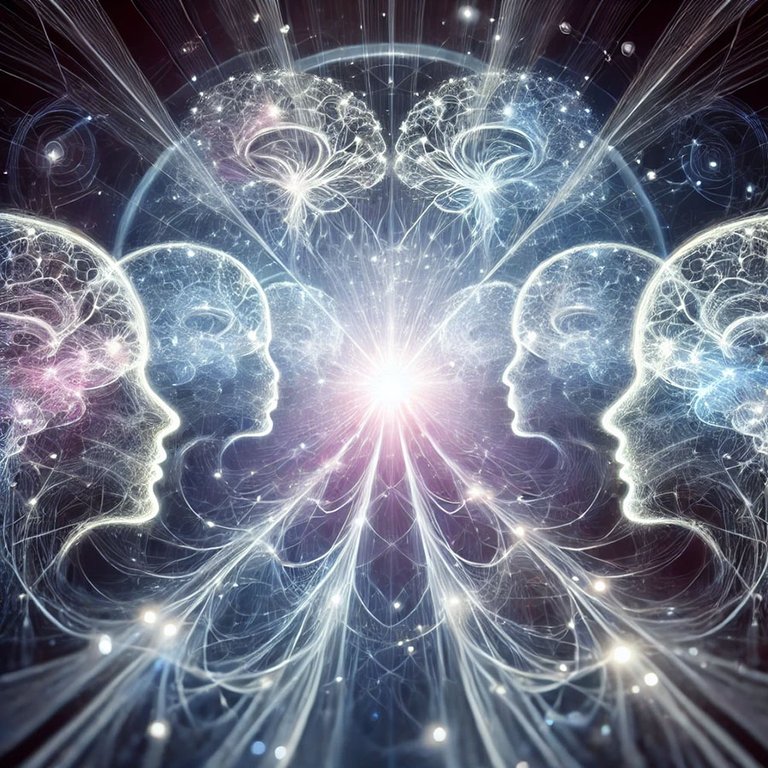A few days ago, @ericvancewalton wrote about a dream he had. In his post he was pondering the meaning and looking at some possibilities. Great post—go read it here. In a comment I went off in a somewhat different direction in which I suggested individual consciousness might disappear in the future. I thought I might explore that a bit in this post.

As we all know, we as a people are being increasingly exposed to the thoughts of everyone else. All of social media: Twitter, Facebook, Reddit, etc. These services are filled with random musings by other people. Some people tweet so often that their stream seems little different from their mind—pretty much every thought they have is laid out there. All of these thoughts are with us all the time now, on our phones. Oh some disciplined people don't install social media on their phone, but I can imagine most people do, especially younger people.
Already we know that people are influenced by other people. People in a group will start adopting many of the same mannerisms, vocab, even ideas and attitudes. This effect increases even more with social media, especially for younger people who are always looking at it.
Well, what happens when this constant stream of social media migrates from our phones to our brains? That idea may seem like sci-fi, but c'mon.. what technology that we have today didn't seem like sci-fi just a few years before we got it? Everything is impossible until we do it, as Arnold Schwarzenegger likes to say. And science has really excelled at making the impossible possible with an increasingly frequency.
More to the point, the microchips are coming... We know that Elon Musk has been throwing money into his project to imbed microchips in our brains for a few years now. If he is doing this publicly, you can bet many more are supporting this same research quietly. It might not happen for many years, it might not even happen within our lifetimes, but eventually they will figure out how to interface a microchip and the brain. And at that point...well, humans as we know them are over.
I mean, c'mon. You have a microchip in your head, it's only a matter of time before they get this to connect to wifi and boom, you have the internet in your head. You have wikipedia and chatGPT in your head. You have access to all of human knowledge instantly. Knowledge will become trivial because we will all know the same things. Intelligence may even become less important, because we all will have AI in our heads to help us out. Needless to say, when this happens, this will really shake up society. Schools will need to radically change or maybe just go away, for starters.
What interests me though is what happens when you have these constant streams of other peoples' thoughts going through your head constantly? I don't think it's a stretch to say unless we are careful, we will face the very real problem of forgetting ourselves.
In Inception they played with the idea of forgetting reality. That if we entered enough false realities and stayed in them long enough, we might forget which one we originally came from or even forget we are in one in the first place. Well, I'm proposing something similar, that we forget who we are.
Think of it: you have all of these streams of thought in your head that kind of look pretty similar to your own stream of thoughts. Having all of these thoughts in your head, you might start to wonder... wait, did I think that or did he think that? Which thought was mine? And so on. What happens when we can no longer accurately tell our own thoughts from other peoples' thoughts?
Do we all become the same? Do we start to mentally merge in some weird Star Trek-esque way where one person starts a sentence and another finishes it? What might the psychological impact of this interconnectedness be? Would society be improved or destroyed? Undoubtably it would revolutionize our world just as other similar "sharing" technologies did, such as the printing press.
I don't think this is an original idea. Science fiction books have been playing with it for a long time. As has real philosophy, where they give it fancy names like "digital identity erosion". But I do think we might be getting close to this actually happening, and when it does we will see where it leads!

What do you think? Sci-fi nonsense? Stoner talk? Let me know your thoughts below.
❦
 |
David LaSpina is an American photographer and translator lost in Japan, trying to capture the beauty of this country one photo at a time and searching for the perfect haiku. He blogs here and at laspina.org. Write him on Twitter or Mastodon. |

 )
)